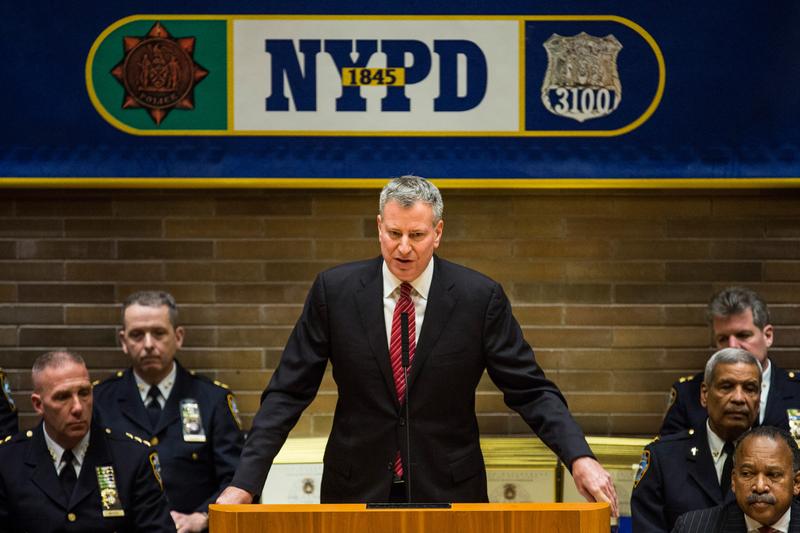
To understand Bill de Blasio’s position on police and community relations, it’s useful to go back to May 2012. That’s when, as Public Advocate, de Blasio launched a campaign against the over-use of the police tactic known as stop-and-frisk. The number of stops had ballooned to more than 680,000 the prior year. De Blasio wanted that number dramatically reduced.
“We need to maintain stop-and-frisk as a policing tool, but we need to use it differently going forward,” de Blasio told a gathering of elected and community leaders.
Then, and throughout his mayoral campaign, de Blasio repeatedly said he respects the police. At that event, for instance, he said, "We believe in a large, assertive police force. We applaud and are profoundly appreciative for the progress this city has made over the last decade."
De Blasio was elected, in large part on his promise to reduce stop-and-frisk, which he’s done. To keep crime low, his Police Commissioner Bill Bratton has instead leaned on a "broken windows" strategy, which Bratton pioneered when he was NYPD commissioner two decades ago. But while reducing stop-and-frisk solved one problem, broken windows has introduced new ones.
For instance, how is broken windows different from stop-and-frisk? The mayor tried to explain last month.
“I equate the broken windows theory with a consistent commitment to responsive policing,” de Blasio said. More specifically, stop-and-frisk is a tactic that’s used when an officer has a reasonable suspicion that a person has or is about to commit a serious crime.
A broken windows strategy, on the other hand, means officers respond when they see a crime being committed. De Blasio said it’s, “policing that addresses community concerns. That addresses any call that a community member makes asking for help.”
But some rank-and-file cops say "any call asking for help" sounds a like what happened on Staten Island, where storeowners and community members had complained that Eric Garner sold loose cigarettes. When officers attempted to arrest him, things ended tragically.
Delores Jones-Brown, a professor of Law and Police Science at John Jay College, said that de Blasio is not alone — any mayor has it tough when it comes to reforming the police department.
“There is a way in which whether to say anything against the existing policing regime, it gets interpreted as anti-police,” said Jones-Brown.
Still, she is not a supporter of broken windows because she said it puts the same kinds of pressure on officers to meet arrest targets as they faced with stop-and-frisk. Jones-Brown also said broken windows hampers an officer’s discretion, meaning their ability to decide whether or not to issue a summons or make an arrest for minor offenses.
Some police officers say broken windows policing is leaving them confused about how to do their job.
“What does that mean at the end of the day, if I still have to go out there and arrest people for selling untaxed cigarettes, you know?” said a patrolman who would only allow himself to be identified as Liam, since NYPD officers are not supposed to speak to the media. He said the mayor is giving them orders but not standing up for police who then follow them.
“Hundreds of thousands of these arrests have to be made a year, because the mayor himself is saying it has to be done and then someone doesn’t want to put their [sic] hands behind their back and then something tragic occurs," Liam said. Then, echoing the sentiments of police union leaders, he said, "The end of the day, the buck stops at his office.”
At funerals for slain NYPD officers over the past two weekends, scores of police officers expressed their frustration by turning their backs when de Blasio spoke.
As he concluded his remarks on Monday about the city’s record low crime rate in 2014, an exasperated-sounding de Blasio appealed on behalf of all New Yorkers for his most divisive critics to quiet down.
“Rather than get lost in the daily back-and-forth in the loudest and most disrespectful voices, those that have been so loud in this debate in recent weeks, let's talk where we need to go as a city, let’s about a positive vision and what this city wants us to do together,” said de Blasio.
For him that means continuing to drive crime down – and moving beyond a month of protests from all sides.
